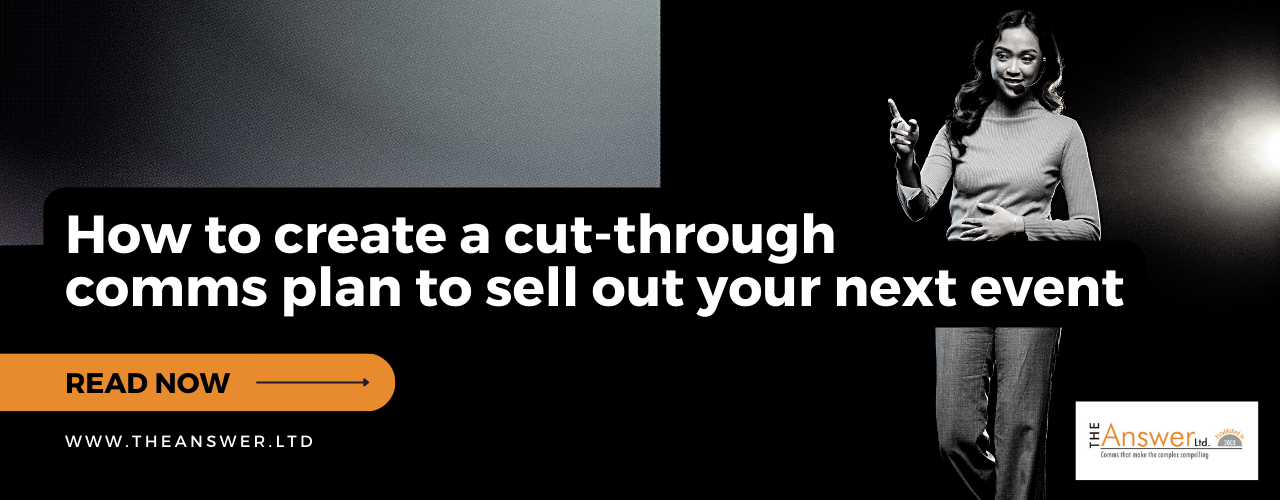How to create a cut-through comms plan to sell out your next event

Creating a cut-through comms plan can help you sell out your next event
Communications plays a key role in helping get the word out about an upcoming event and conference. But how do you stay focused and ensure your key messages reach the desired audience in a world full of digital noise?
The team at TheAnswer Ltd are experts in this area; whether you’ve hosted one in-person conference or recently dabbled in your very first virtual event, we can help you create a comms plan that’s guaranteed to deliver results.
Read on to discover why it’s vital to choose a mixture of channels and plan ahead.
Build a profile of your audience
Digging deep into the types of people you are targeting to come to your event is the place to start:
Who are they?
Where are they based?
What is their job role?
Which industry are they in?
What communications channels do they use most?
Try using demographic data from Google Analytics on your website, job industry data from your LinkedIn followers, or tap into previous event attendee surveys for a more qualitative approach. Then, create 3-4 personas of each and give them a name. This will help you build a clear profile of your audience and help take you to the next step: your message.
Design your key messages

Now that you've defined who you’re trying to talk to, think about what you’re trying to say. This may start with the overall strategy of the event itself: Why are you hosting it in the first place? Is it designed to:
Build a community around a topic e.g. art?
Drive awareness of a local issue or charity?
Be educational?
Try writing down 5 reasons why someone would want to attend your event in bullet point form. Think about what you’d like them to take away at the end of the day: What do you want them to hear, understand, and remember? This will help shape your message into a benefits-driven communication that is easy to consume and most of all, memorable.
Create a timeline

Creating a timeline will help you map out which messages should be sent and when, to make sure all bases are covered. Depending on the event, the first communication could be sent anywhere from 3 years in advance (think about the Olympics) whereas an online webinar may only need 2 weeks to promote.
Timing all depends on the level of commitment needed from the attendee, marketing budget, audience size, and goals of the event itself. Start with the date of your event and work backwards, around 3 months should be a good place to start.
Then, try breaking each event down into segments:
- Pre-event: registration confirmation emails, iCal calendar reminders, website updates, speaker and agenda announcements, social media buzz, countdowns.
- During the event: print signage, posters, media coverage, verbal announcements on speaker, welcome emails, mobile apps, live social media posts, behind-the-scenes coverage.
- Post-event: thank you emails, feedback surveys, photo galleries.
You can do this using an Excel spreadsheet or your preferred software.
Decide on your media channels
Now you have your audience and timeline defined, it’s time to select where this will be displayed. Again, this depends on your goal, marketing budget and size of event, so think about which channels best suit your events:
Social media is a powerful free tool and can be excellent for organically sharing your event content. If you already have thousands of followers, using social media to amplify the reach, tapping into professional networks like LinkedIn.
PR and media can provide coverage at your next conference to boost your brand and the event’s activities to wider audiences. Having a good agency on-site on event day can generate a buzz and capture the live moments in real-time.
Speakers and sponsors can help promote the event through their own networks which helps recommend your brand. Advocacy is becoming an increasingly popular tool as part of event marketing strategies. Check out Gleanin’s nifty tool that helps make this smooth and easy for your partners to talk about the event on social media, email, WhatsApp, Slack and many more.
-
Looking for help with planning communications around your next conference or event? We offer operational support, branding, marketing, publicising, and post-event follow-up. Get in touch today to see how TheAnswer Ltd can work with you.
